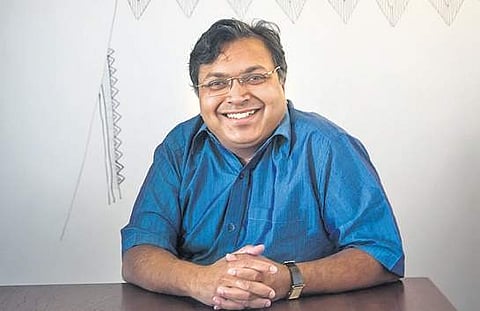

BENGALURU: Devdutt Pattanaik is well-known for his written works and lectures on mythology. He has to his credit over 50 books and 1,000 columns on how stories and rituals construct the subjective truth of ancient and modern cultures around the world. His latest book, Faith: 40 Insights into Hinduism, provides information on the complex tenets of Hinduism. Excerpts from an interview:
What draws you towards writing about mythology?
I have always been interested in ancient stories, whether it is from Greek mythology or Egyptian mythology and how it explains the different ways in which different cultures think. Both ancient and modern. Most people have not realised how much these traditional stories reveal about human behaviour. We relegate mythology to the past when it is for all times.
How do you corroborate the facts you mention in your books?
These facts are basically common historical knowledge that is done by a lot of historians around the world. A lot of research has been done on texts and most of my facts are basically the texts from which these stories have been taken or the dating of images or temples. These are common knowledge in the field of history, art history and anthropology. I also use a lot of information from behavioural sciences and animal behavioural sciences, botany and zoology as per needs. For me, the most important facts are really the dating of texts which are extremely difficult.
But nowadays scholar have a very fairly good idea where most texts are in a particular range of errors.
You must understand the difference between facts and myths and fiction of course. Fact is everybody’s truth that is measurable, fiction is nobody’s truth and the stuff of fantasy and myth is cultural truth, therefore, somebody’s truth. God, for example, is not a fact but a myth believed by some people. Money is not a fact but a myth based on storytelling. Justice is not a fact but a myth but the assumption based on the hope and belief of people.
Which mythological tale has intrigued you the most?
Every mythological tale is intriguing because every mythological tale is a part of a larger jigsaw puzzle. Indian mythological tales, of course, excite me a lot because very few people appreciate the role played by rebirth in shaping the way in which Hindus, Buddhist and Jains see the world. We don’t realise that concept such as Judgement day which is found in Christianity, Islam and Judaism while being religious has shaped modern nation states.
What changes are you hoping to bring about in people’s perception of Hinduism?
I have no desire to change people’s perception of Hinduism. I just draw attention to various aspects of Hinduism that was not brought to my notice when I was growing up. If it helps other people, great! I think we have a very narrow view of Hinduism today based on what the English and the Europeans translated and even those who claim to have read the original text essential regurgitate ideas that were created by European orientalists.
I think that for me is the most exciting to widen the perception of people. If at all there is a change it is to know more and when your denominator of knowledge is more when your interpretation is based on vast amount of information it is likely to be very different from the interpretations that you have with limited knowledge.
Is Hindu mythology more accepting of queerness than the Indian society we live in?
Hindu mythology refers to all kinds of creatures. In ancient India, there was always reference to the male, female and the other or the queer. The queer was the category of people who did not fit into the binary of the male and female. This view of the world is not found in modern Indian society because modern Indian society with its laws is very strongly shaped by a colonial mindset.
We must remember that Europeans controlled India for 200 years and made us ashamed of our own culture and therefore today many Indians mistake their prudishness for traditional Indian prudishness when in fact its roots are in Victorian morality. In ancient India, we had dancers, singers and entertainers known as Natees, which were a matriarchal society and they thrived and we learn about them from Buddhist, Jain and Hindu literature. Even in Islamic time they thrived. However, following the arrival of the British, they were deemed prostitutes and rejected. In the same way, many of the queer communities in India were involved in entertainment activities and they were rejected as criminals and perverts.
What is your view on Hinduism as portrayed by politicians today?
Both Right-Wing and Left-Wing have their own versions of Hinduism. As far as the Right is concerned, everything in Hinduism is perfect and nothing should be challenged. As far as the Left is concerned, everything in Hinduism is imperfect and needs to be challenged.
For the Left Hinduism is only about casteism, while the Right sees it is an egalitarian Vedanta philosophy that embraces and includes all.
Each one brings their own bias, for the Right any criticism is unacceptable, and for the Left everything is only about criticism because the Left doesn’t believe that religion should exist.
Both of them are flawed by their bias. Every religion has strengths and weakness and you must see them from their point of view.